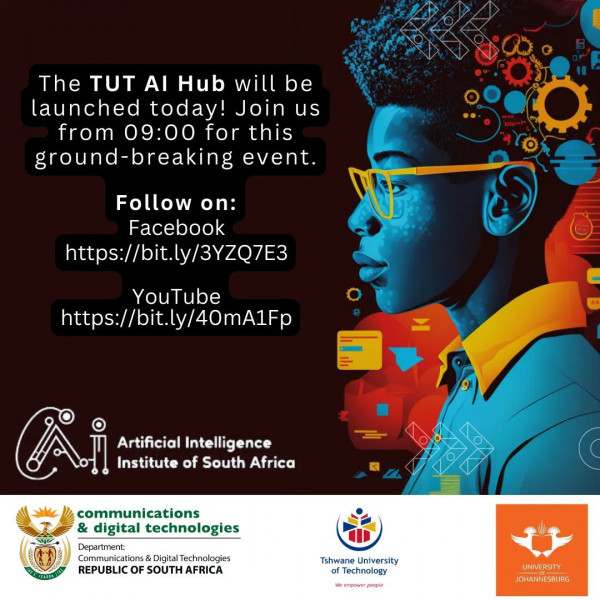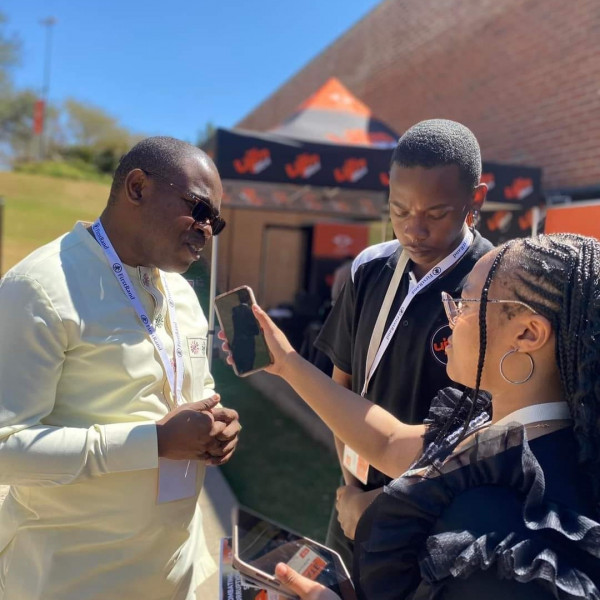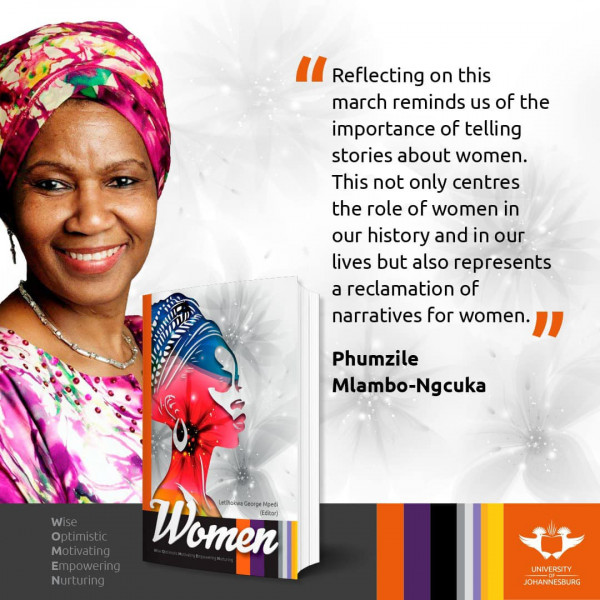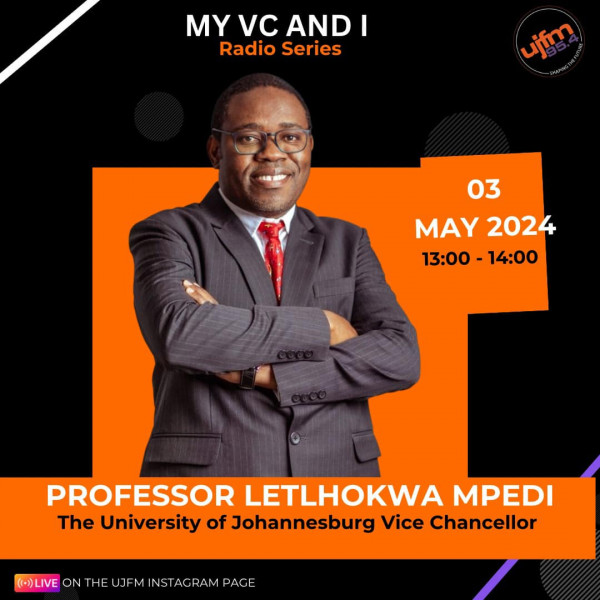
UJ and TUT collaborate to launch TUT Hub of the AI Institute of South Africa
Loading player...
“ At the end of November, the Department Of Communications and Digital Technologies (DCDT), the University of Johannesburg (UJ) and the Tshwane University of Technology (TUT) established the Artificial Intelligence Institute of South Africa as an innovation engine for public and private sectors in line with the Presidential Commission on the 4IR (PC4IR). This was a natural fit. The DCDT has embarked on various 4IR initiatives in its recent history while UJ and TUT have emphasised their positions in the 4IR in recent years and has emerged as a leader in the space in the country and the continent. Our collective dominance in this space reaches far beyond South Africa’s borders to Africa and elsewhere in the world.”
Prof Mpedi added that the institute will focus on bringing the ideas of the 4IR to life: “This institute will focus on research and development, as well as implementation capabilities in artificial intelligence (AI). A mandate to include training will bolster the investment in human capital. As a result, the AI institute is ultimately envisioned as a vessel responsible for the country’s AI capabilities and applications across sectors and deal with arising ethical issues. Ultimately, the goal is to facilitate the expansion of AI expertise across the continent by drawing from both the local population and international expertise. Today, marks the launch of the AI.”
Strategic placement of the two hubs to serve various needs
Minster of the DCDT Mondli Gungubele explained during his keynote address how the AIISA’s two hubs had been strategically placed to serve different needs. The two hubs, Minister Gungubele said are each linked with an economic sector that they can enhance through AI by a series of catalytical project.
“For example, the TUT AI Hub is linked to the sectors of automotive, health, transportation, digital identity and mobility, while the JBS AI Hub is linked to manufacturing, mining, criminal justice system amongst others,” he said.
TUT Vice-Chancellor Tinyiko Maluleke in his remarks took the audience on a journey to the year 2025 where “Lerato”, a prospective TUT student would benefit from the work that will have been done by the AIISA. Prof Maluleke painted a picture where everything from residence applications to funding applications would be handled from one central point-due to the capabilities of AI.
Speaking on the value of the AIISA, Prof Maluleke said: “South Africa is not going to be left behind in the global 4IR wave. This hub is an important tool for future generations and by far the most strategic plan with massive potential of economic impact.”
Collaboration between UJ and TUT is vital for South Africa to become a smart society
Johannesburg Business School Dean, Prof Randall Carolissen said the collaboration between two smart institutions is vital: “The collaboration between two smart institutions in UJ and TUT is vital because we can ultimately have South Africa become a smart society. The country has all the ingredients to make this a reality.”
Prof Carolissen added that since launching the Johannesburg Hub they have been inundated with requests from public and private sector players wanting to collaborate with the AIISA.
Projects currently being worked on by the UJ AIISA hub
Some of the projects the UJ AIISA hub are working on currently include: a virtual market place, AI Biometric systems, criminal justice system development and AI in Farming and Food production.
Ending off his keynote address, Minister Gungubele encouraged the two institutions to go forth in the wide arena of the 4IR and prosper: “These universities currently at the helm of the AIISA are saying South Africa must assume responsibility for our future. To this this I say go forth and prosper, Aluta Continua!
Prof Mpedi added that the institute will focus on bringing the ideas of the 4IR to life: “This institute will focus on research and development, as well as implementation capabilities in artificial intelligence (AI). A mandate to include training will bolster the investment in human capital. As a result, the AI institute is ultimately envisioned as a vessel responsible for the country’s AI capabilities and applications across sectors and deal with arising ethical issues. Ultimately, the goal is to facilitate the expansion of AI expertise across the continent by drawing from both the local population and international expertise. Today, marks the launch of the AI.”
Strategic placement of the two hubs to serve various needs
Minster of the DCDT Mondli Gungubele explained during his keynote address how the AIISA’s two hubs had been strategically placed to serve different needs. The two hubs, Minister Gungubele said are each linked with an economic sector that they can enhance through AI by a series of catalytical project.
“For example, the TUT AI Hub is linked to the sectors of automotive, health, transportation, digital identity and mobility, while the JBS AI Hub is linked to manufacturing, mining, criminal justice system amongst others,” he said.
TUT Vice-Chancellor Tinyiko Maluleke in his remarks took the audience on a journey to the year 2025 where “Lerato”, a prospective TUT student would benefit from the work that will have been done by the AIISA. Prof Maluleke painted a picture where everything from residence applications to funding applications would be handled from one central point-due to the capabilities of AI.
Speaking on the value of the AIISA, Prof Maluleke said: “South Africa is not going to be left behind in the global 4IR wave. This hub is an important tool for future generations and by far the most strategic plan with massive potential of economic impact.”
Collaboration between UJ and TUT is vital for South Africa to become a smart society
Johannesburg Business School Dean, Prof Randall Carolissen said the collaboration between two smart institutions is vital: “The collaboration between two smart institutions in UJ and TUT is vital because we can ultimately have South Africa become a smart society. The country has all the ingredients to make this a reality.”
Prof Carolissen added that since launching the Johannesburg Hub they have been inundated with requests from public and private sector players wanting to collaborate with the AIISA.
Projects currently being worked on by the UJ AIISA hub
Some of the projects the UJ AIISA hub are working on currently include: a virtual market place, AI Biometric systems, criminal justice system development and AI in Farming and Food production.
Ending off his keynote address, Minister Gungubele encouraged the two institutions to go forth in the wide arena of the 4IR and prosper: “These universities currently at the helm of the AIISA are saying South Africa must assume responsibility for our future. To this this I say go forth and prosper, Aluta Continua!




